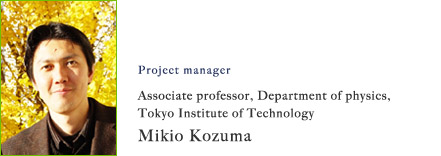- 02 (2010 Selected):⇒This research proposal was terminated at the end of March 2011 due to be selected by Funding Program for Next Generation World-Leading Researchers (NEXT Program).
- Realization of cluster quantum computation using a Fermi-degenerate 171Yb atomic ensemble

The objective of this study is to realize cluster quantum computation by applying cavity QED technology to a Fermi-degenerate 171Yb atomic ensemble. In 2001, cluster quantum computation was proposed by Raussendorf and Briegel [1]. Unlike conventional quantum computation by a combination of unitary gates, in cluster quantum computation the cluster state is generated among a number of qubits and the projective measurement of each qubit is then performed. Cluster computation is invaluable for systems, such as neutral atomic gases, where a very large number of qubits (as many as 106) are relatively readily available and can be regularly arranged by optical lattices. In 2003, Bloch et al. succeeded in generating a cluster state. They caused the Mott transition of Rb condensates, individually trapped atoms in optical lattice sites, and then performed electron-dependent potential control to induce an Ising-type interaction, creating a cluster state [2]. This success significantly increased the possibility of realizing large-scale quantum computation. Unfortunately, however, due to the use of electron spins, the coherence time was as short as 1 ms. In addition, the projective measurement of individual electron spin was not possible.
In this publicly solicited research project, we aim to realize cluster quantum computation based on the following five principles:
1. Use as a qubit a nuclear spin with a coherence time 2000 times that of an electron spin. Specifically, 1/2 the nuclear spin of the ground state of 171Yb is used.
2. Arrange Yb atomic ensembles as qubits in arrays in a plane of about 1 μm on the object lens surface. Make it possible to examine in detail the arrangement of qubits by high-resolution fluorescence microscopy using the solid immersion effect.
3. Generate a cluster state required for computation using a new mechanism called a nuclear spin-dependent optical trap based on forbidden transitions normally used only in atomic clocks. Realize the real-time operation of potential using a spatial phase modulator.
4. The key to the success of cluster computation is whether the projective measurement of individual spins can be performed with high quantum efficiency. Realize high-speed, high-efficiency projective measurement using cavity QED technology based on optical microcavities. For its realization, the fluorescence emission rate is increased for microsecond-scale observation by exciting specific atoms in an optical lattice to the 3P2 metastable state and applying cavity QED using an allowed transition from the 3P2 metastable state to the 3D3 state.
In our previous studies, we have measured the quantum state of the nuclear spins of a single Yb atom and developed techniques for full control of the quantum state. These include projective measurement of a single nuclear spin using a bias magnetic field [3]; measurement intensity control using a single photon as an ancilla [4]; trapping of a single Yb atom for a few seconds in an optical microcavity, as well as quantum tomography with a fidelity of more than 0.98 [5]; and projective measurement of a single nuclear spin by two-mode cavity QED [6]. Using these techniques, we aim to realize cluster quantum computation using Yb atoms in a two-dimensional optical lattice.
[1] R. Raussendorf and H. J. Briegel, Phys. Rev. Lett. 86, 5188 (2001).
[2] O. Mandel et al., Nature (London) 425, 937 (2003).
[3] M. Takeuchi et al., Phys. Rev. A 81, 062308 (2010).
[4] N. Takei et al., Phys. Rev. A 81, 042331 (2010).
[5] A. Noguchi et al., arXiv: 1005.3584 (2010).
[6] Y. Eto et al., arXiv: 1012.1724 (2010).
Details : 「Publications」













